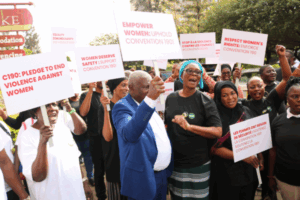The concept of the “living wage” appears twice in the International Labour Organisation’s Constitution. Adopted in 1919 as part of the Treaty of Versailles after World War I, the Constitution’s preamble declares that “universal and lasting peace can be established only if it is based upon social justice”, and calls for an improvement in conditions of labour, including “the provision of an adequate living wage”. A second mention appeared after World War II, when the ILO adopted the Declaration of Philadelphia, which was then incorporated into the ILO Constitution. The Declaration affirmed the “solemn obligation” of the ILO to promote “policies in regard to wages and earnings, hours and other conditions of work calculated to ensure a just share of the fruits of progress to all, and a minimum living wage to all employed and in need of such protection”.
Over the years, the ILO Office has developed strong expertise and collaboration on matters related to wage policies. It has supported many member states in strengthening or establishing new minimum wages, promoting collective bargaining over wages, reducing gender pay gaps, and ensuring workers receive their wages timely and in full. On all these subjects, well-known ILO conventions and recommendations exist which many member states have ratified. The ILO has also been publishing its flagship Global Wage Report every two years since 2008, along with guidance and information documents like its Minimum Wage Policy Guide and the Review of Wage Setting through Collective Bargaining.
Strangely, however, ILO constituents have never agreed on a definition of the concept of the living wage, nor have they provided any specific guidance on how to operationalize it. Now, more than a century since the ILO’s first affirmation of its commitment to a living wage, this oversight has finally been corrected.
In March 2024, the ILO Governing Body adopted on behalf of the organisation’s 187 member states the conclusions reached during a tripartite meeting of experts on wage policies, including living wages (hereafter called the ILO Conclusions), which took place in Geneva in February 2024. Negotiated and agreed upon in a global tripartite setting – that is, by governments, employers, and workers from all corners of the world – the Conclusions provide the growing community of living wage initiatives with guidance from the ILO.
The return of living wage initiatives
This new ILO guidance is timely, as debates about living wages are back on the agenda. Around the world, the number of living wage initiatives has increased in recent years, both among the public and private sectors. These initiatives have given great visibility to the living wage concept. Living wage initiatives include, for example:
- Action Collaboration Transformation (ACT), an agreement between the IndustriALL Global Union and 20 global brands in pursuit of living wages for workers in textile and garment supply chains. The initiative promotes collective bargaining at the industry level, enabled by more responsible purchasing practices.
- Forward Faster, an initiative of the UN Global Compact. Under one of its targets, its member companies can commit to paying living wages to all their employees. Under a second target, the initiative promotes joint action plans between member companies and their contractors, supply chain partners, and other key stakeholders to work towards achieving living wages or living incomes with measurable and time-bound milestones.
- The Corporate Sustainability Due Diligence Directive (CSDDD), a directive recently adopted by the European Union. Under this directive, large companies will soon be legally obliged to factor in living wages and living incomes when doing business in the EU Single Market. EU member states now have two years to transpose the directive into national law.
The ILO concept of the living wage
So what are living wages? In line with the ILO Constitution and the Philadelphia Declaration, and consistent with the spirit of the Universal Declaration of Human Rights (UDHR), the ILO Conclusions denote that the concept of the living wage is three things:
- The wage level that is necessary to afford a decent standard of living for workers and their families, taking into account the country’s circumstances and calculated for the work performed during the normal hours of work;
- calculated in accordance with the ILO’s principles of estimating the living wage;
- to be achieved through the wage-setting process in line with ILO principles on wage setting.
In the remainder of this paper, we discuss what the Conclusions say with respect to the last two bullet points: the estimation of living wages and the operationalisation of living wages.
ILO principles of estimating the living wage
Currently, living wage initiatives use a variety of methodologies to estimate living wages, which can produce different results. Methodologies calculate the cost of a basket typically comprising food, housing, health, education, and other essential goods and services necessary for a basic but decent living standard for workers and their families. These estimates translate the living wage concept into a national monetary value.
While the ILO Conclusions identify no single best methodology, they call for a number of principles to be respected. Among other criteria, methodologies should be transparent, publicly available, and open to scrutiny. This is currently far from being always the case. Furthermore, representative employers’ and workers’ organisations should be consulted and involved from the start and throughout the development of the estimate, with a view to ensuring national or local ownership. Clearly, if estimates and methodologies are only available to multinational enterprises for pay, there can be no meaningful social dialogue or local ownership.
Challenges in the estimation of living wages are numerous, as several assumptions are necessary to produce estimates – including assumptions about family size, the number of wage earners per household, and the exact basket of goods and services included in the estimate. Hence, what represents a basic but decent standard of living in a particular regional or local context can only have legitimacy if it is determined in agreement with social partners and relevant stakeholders.
Guidance on the operationalisation of living wages
Once estimates are available, a big question remains: How can stakeholders achieve or “operationalise” living wages?
The ILO Conclusions emphasise the central role of social dialogue and collective bargaining in wage setting. They call on living wage initiatives to strengthen social dialogue and empower wage-setting institutions, particularly collective bargaining – which can contribute to the fair distribution of value, including along global supply chains. Tripartite social dialogue should be at the heart of adequate statutory minimum wage systems and promote the incremental progression of minimum wages to living wages, in line with the ILO Minimum Wage Fixing Convention No. 131. Living wage estimates can inform and contribute to evidence-based social dialogue but should not be used as a substitute for good wage-setting practice.
The Conclusions also recall that the needs of workers and their families and economic factors are the two pillars of wage setting. Indeed, high living wage estimates can be difficult to implement and — if implemented “blindly” — may have negative effects on employment or on the sustainability of enterprises. This can be observed for example by contextualising and comparing living wage estimates with the prevailing wage structure, understanding living wage estimates in terms of a percentage of the median or average wage. Hence, strategies to promote living wages should go beyond the realm of wage-setting mechanisms alone and seek to improve economic factors to raise productivity, for example by enhancing the business environment and investment climate and fostering structural transformation.
Linked to this previous point, the Conclusions also emphasise the need to consider national circumstances and tackle the root causes of low pay, such as the unfair distribution of value along supply chains, low productivity, informality, weak institutions, and compliance systems. Wage discrimination can also be a source of low pay for women or other groups of workers, so living wage initiatives should aim to close gender pay gaps and end wage discrimination, in line with the principle of equal pay for work of equal value. Last but not least, living wage initiatives should recognise the role of the state, as governments should invest in the quality and delivery of their public services, contributing to a decent standard of living. Strengthening compliance systems, including labour inspectorates and other relevant authorities, can ensure that workers receive the wages they are entitled to.
The new mandate for the ILO
With these newly adopted tripartite Conclusions, the ILO Office is now equipped to engage with the many existing living wage initiatives and promote alignment with the principles outlined above. The ILO approach, based on social dialogue and robust, reliable data and statistics, can ensure that the operationalisation of living wages is anchored at the national level and connected to national wage-setting dialogue and processes. The ILO Office will also make available its own methodology for estimating the needs of workers and their families for the purpose of a living wage, and help strengthen the capacities of constituents to actively engage with living wage initiatives.
If living wages are conceived and implemented in the right way, they can make a huge difference for the millions of workers across the world who continue to earn very low wages and are still living in poverty.
__________________________________________
References
Emmanuel Reynaud (2017), “The International Labour Organisation and the Living wage: A Historical Perspective”, ILO, Geneva
ILO 2024a, “Adopted Conclusions for the Meeting of experts on wage policies, including living wages (Geneva, 19–23 February 2024)”, ILO, Geneva https://www.ilo.org/resource/adopted-conclusions
ILO, 2024b, “Report for discussion at the Meeting of Experts on Wage Policies, including Living Wages (Geneva, 19–23 February 2024”, ILO, Geneva
https://www.ilo.org/resource/wage-policies-including-living-wages
_________________________________________







